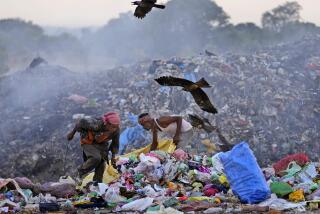India rickshaw pullers see ‘pretty bleak future’
- Share via
Reporting from Kolkata, India — In a gloomy building off Ganguly Street with 12-foot ceilings and floors carpeted with wood chips, Mohammad Manawwar spends his days building the obsolete.
Nearly half a century ago, his father and grandfather taught him how to hand-craft a rickshaw, shaping the spokes and outer arc of the oversized wheels from pieces of ash and lining the bucket seat with a pillow of flax.
“For years, they’ve threatened to close us down,” he said. “But we’re still here.”
Welcome to Kolkata, where poverty, inertia and entrenched interests have made this former capital of the Raj a soulful, somewhat squalid bastion of fading traditions and technologies.
Kolkata borrowed the design and use of the two-wheeled carts from China in the late 19th century and, the craftsmen here say, they remain virtually unchanged.
Manawwar said he doesn’t expect his sons to follow in the family business. Rickshaws may be doggedly clinging on in this computer age, but they’re hardly a growth industry.
“It’s a pretty bleak future,” said Mukhtar Ali, head of the All Bengal Rickshaw Union, who estimates that 6,000 rickshaws and 18,000 drivers still ply the city’s twisted back alleys, continuing a legacy dating to 1919, when the British officially recognized the vehicles as a public means of transportation.
It’s a pretty bleak present too.
Today owners rent the rickshaws out to pullers for about 50 cents a half-day. The ill-clad drivers with spindly legs make a couple of dollars after expenses, slogging in the heat and rain, keeping passengers out of fetid street water during monsoons, even if they themselves are knee-deep in it.
“I feel a bit sad when I realize how little I have,” said Satinder Prasad, 32, who works 16 hours a day to support his family. “But what can I do? This is my fate.”
In 2006, the transport minister of West Bengal state, of which Kolkata is the capital, banned hand-pulled rickshaws in a bid to reduce congestion and project a more modern city image. Even then, Kolkata, formerly known as Calcutta, was the last Indian city to use them regularly. Other Indian cities have cycle rickshaws that the drivers pedal.
Thousands of the vehicles were seized after the ban, and slated for destruction, until a public outcry forced the West Bengal government to back down, leading to a compromise: The rickshaws could ply the back streets but not main thoroughfares.
In reality, this has exposed the rickshaw pullers to corrupt police who are in a position to rather arbitrarily determine whether they’re breaking the rules, costing them as much as 10% of their income, according to a 2007 study by ActionAid India.
Although few pullers enjoy the work, they are protective of their livelihood. Most are older than 40, come from the impoverished neighboring state of Bihar and know little else.
“If we didn’t have this job, we’d have no way to make money,” said Mohammed Samsul, 50, who supports five children and a wife back in the village with his $2.50-a-day earnings.
Cleaning toilets is also inhumane work, but the government doesn’t ban that, said rickshaw puller Nur Mohammed, 35. “The government just doesn’t like looking at poor people,” he said. “It’s worse than the British.”
The rickshaw pullers do suffer. Their legs ache and their stomachs knot up, but few can afford medical care.
“I use Vicks muscle rub,” Samsul said. “And twice a year, I go back to my village to give my body a break.”
Most are uneducated, too old to retrain and all but trapped, leaving some government planners to predict that the industry will die of attrition.
Even a few dollars a day is far more than they’d earn on the farm. But life in the big city, where many sleep on the street or crowd five to a room in dingy apartments, also makes them feel ugly for being poor, something they rarely felt in the village.
Although some of their well-heeled customers are civil, others insult and shortchange them, treating them as little more than animals.
Hand-pulled rickshaws have survived so much longer here than elsewhere in India because there’s a ready supply of people willing to do the work and more modern vehicles can’t navigate the narrow alleys.
“Only in Kolkata do they carry on,” said J.N. Mundra, 68, a social worker. “Life is very cheap here.”
As the industry slowly declines, pullers say they can’t be choosy.
“Sometimes you see a really fat, 220-pound customer and you know you’re in for a hard time,” Mohammed said. “But you still have to pick them up. Money is money.”
mark.magnier
@latimes.com
Anshul Rana of The Times’ New Delhi Bureau contributed to this report.
More to Read
Sign up for Essential California
The most important California stories and recommendations in your inbox every morning.
You may occasionally receive promotional content from the Los Angeles Times.






